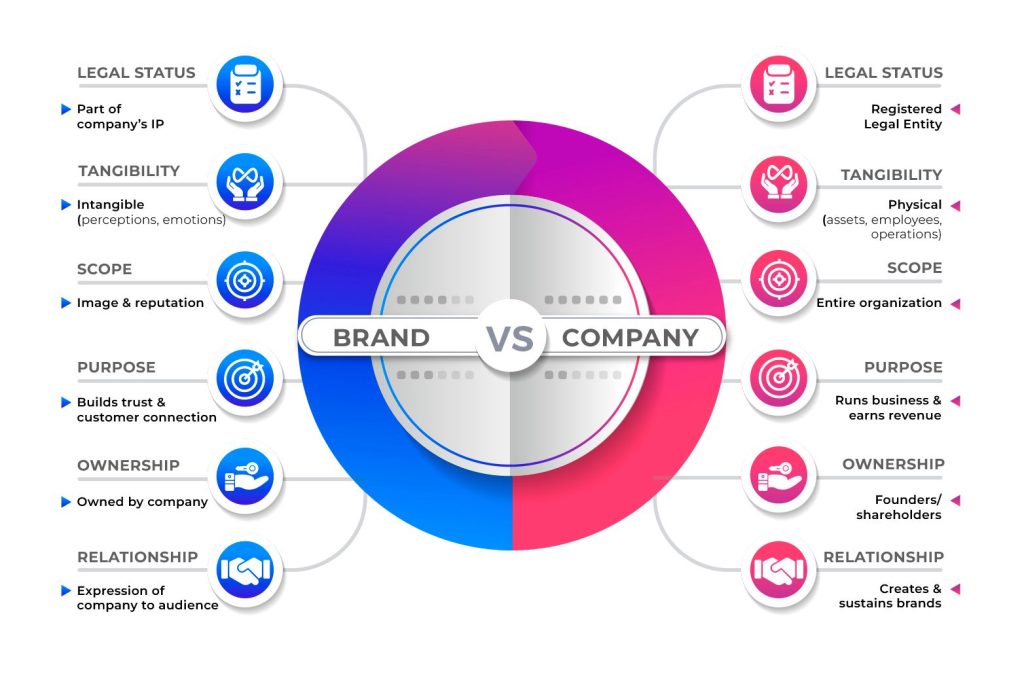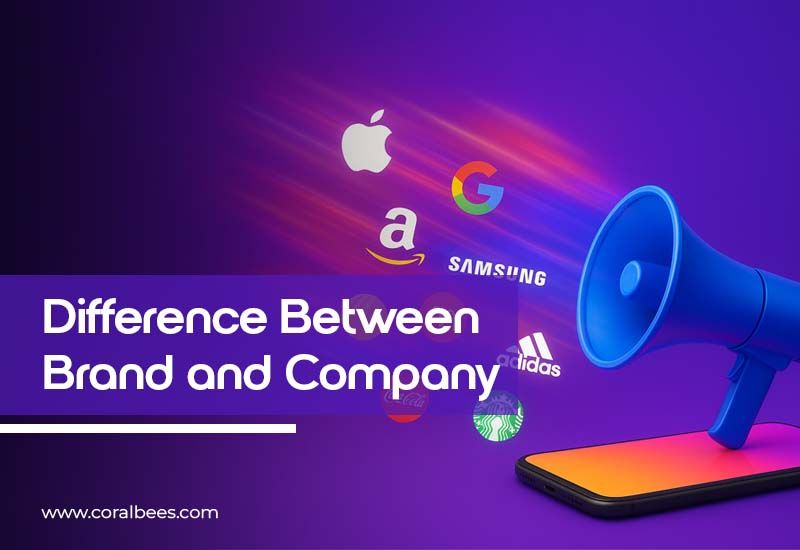Understanding the difference between brand and company is essential for every business owner. Many people assume the two are the same, but they are distinctly different. A company or business is a structured legal entity, which provides a particular product or service. However, a brand indicates the perception and experiences people associate with what the company offers.
In today’s competitive market, creating a brand is vital. So, recognizing the difference between the two tems is the initial step of building a strong presence.
What is a Company?
A company is a registered legal entity formed by individuals that manufactures products or delivers services for profit or public benefit. It is an organization that has rules, responsibilities, rights and assets. The focus of a company lies in its operations be it product development, sales, human resources or finance.
Every company differs in its own structure and objectives, ranging from sole proprietorships to large private or public corporations that may operate locally, or expand internationally. A company grows by improving efficiency, generating revenue and sustaining its activities over the long term. Regardless of size, industry or growth stage, collaborating with the right branding agency in Kerala can help it position itself effectively in the market.
What is a Brand?
A brand is the collective perception of a company formed by its customers regarding its products or services. The term ‘brand’ is not limited to a company’s logo, desing or catchy slogan; instead it reflects the company’s identity, voice and experience the customer associates with it. In essence, a brand is like the personality of a company which influences emotions and creates connections.
A strong brand fosters trust, encourages loyalty, and shapes the business’ reputation. It exists in the minds of the target audience, and when people think of it, they recall its visual identity, product quality and the experiences and values it represents. All these perceptions of the brand are formed through marketing, storytelling and consistent value delivery, highlighting the importance of branding in business.
Key Differences Between Brand and Company
The primary difference between brand and company highlights that a company as the physical, legal entity, while the intangible image built around it is referred to as a brand. A brand cannot exist without a company behind it, as the company creates and markets it. However, a single company can own multiple distinct brands.

Here are the key differences:
Legal status:
- Company: A formally registered and recognized organization with defined structure and functions.
- Brand: Not an independent legal body, but a part of a company’s intellectual property.
Tangibility:
- Company: It is a physical entity that has assets, workforce and day to day operations.
- Brand: It is an abstract entity which exists in the minds of customers as emotions, perceptions and experiences.
Scope:
- Company: Covers the entire organization such as its legal structure, assets, employees, and business activities.
- Brand: Concentrates on how the business is viewed, and is focused on the image, reputation and customer impressions.
Purpose:
- Company: It engages in commercial activity, generates income, and pursues long term goals.
- Brand: It aims to differentiate products/services, nurture trust, spark emotional bonds and guide customer choices.
Ownership:
- Company: Owned by its founders, partners and shareholders.
- Brand: Belongs to the company that builds and nurtures it.
Relationship:
- Company: It is broad and represents the overarching structure that creates and sustains the brand.
- Brand: It is a strategic expression of the company, created to attract specific audiences, resonate with them and build lasting connections.
Why Companies Need Strong Brands
A company must have a product or service to survive, but what fosters its growth is its distinctive brand. Having a strong brand shapes customer trust, loyalty, and preferences; not just recognition. Besides, it gives the company a competitive edge while justifying premium pricing and improving overall business value.
Here are the reasons why strong brands are essential:
For customers:
- Simpler choices: with a familiar brand, customers can identify products quickly, reducing uncertainty and effort.
- Trust and reliability: consistent branding lets them experience dependable quality, assuring them of a reliable experience every time.
- Emotional and symbolic value: brands embody values, lifestyle, and identity. Beyond utility, customers will have a sense of pride and belonging.
For Companies:
- Competitive edge: a strong brand makes the product stand out in a competitive marketplace by enhancing its appeal.
- Customer loyalty: since branding nurtures lasting relationships, it turns casual buyers into repeat customers and enthusiastic advocates.
- Pricing power: trusted brands can justify premium pricing, which leads to healthier profit margins.
- Recognition and familiarity: with consistent branding, the company becomes instantly recognizable even in saturated markets.
- Talent magnet: respected brands easily attract skilled professionals and motivates employees to stay engaged.
- Growth and market value: strong brands increase sales and business value while supporting brand extensions.
- Effective marketing: customers adapt campaigns so quickly from brands they trust, which makes investments in advertisements more impactful.
A strong brand sets the company apart in competitive markets, motivates employees, attracts top talent and builds emotional bonds with the customers. This way, it drives higher revenue, ensuring the company’s long term success.
By investing in brand identity and customer experience, a company secures both growth and resilience. Collaborating with the best digital marketing agency in Calicut can accelerate this process.

Can a Company Have Multiple Brands?
A single company can have multiple brands under its umbrella, which is a common business strategy. With each brand, companies can target different audiences, while focusing on separate product lines and representing distinct values. Likewise, a parent company can operate in various industries like food, fashion, technology, or construction. However, each brand maintaints separate brand image and customer following. This tactic allows companies to diversify, and reach wider markets with minimized risks. Moreover, this approach enables businesses to realize the potential of brand architecture in expanding reach without losing identity.
How to Build a Strong Brand for Your Company
For any company, building a strong brand requires a consistent, creative and strategic effort; so that it can go beyond a logo and name. A strong brand also resonates emotionally with the customers, build long term trust and loyalty, while standing out from competitors,
Here are the key steps to build a strong brand:
Define brand identity: the initial step is to clarify what your business stands for, the values you follow, and how you communicate with your audience.
Create a visual identity: Use a clear logo, right colors, and readable fonts that make your brand easy to recognize.
Understand the target audience: Learn what your customers want, how they behave, and what matters most to them.
Offer consistent customer experience: Keep the quality steady across your products, services, and every interaction.
Leverage social media: Use online platforms to share content that shows your brand’s personality and voice.
Build trust: Keep your promises, be transparent, and show reliability in every step.
When these steps are followed, a company can shape a brand that stays memorable and wins customer trust and loyalty for the long term. Reaching out to a trusted brand and digital agency effectively eases the entire process.
Conclusion
The difference between brand and company lies in many aspects including function and perception. A company represents the legal and operational side of business, while a brand represents the experiences and emotions customers attach to it. For long term success of the business, both brand and company must work together.
Understanding this distinction and investing in creating a strong brand can build trust, customer loyalty, and an effective presence in competitive markets. To know more, read our article on the importance of branding in business.
FAQ
1. What is the difference between a brand and a company?
A company is a legal entity that operates to deliver products or services. On the other hand, a brand is the overall emotional perception and identity customers form around those offerings.
2. Can a company be called a brand?
A company can be referred to as a brand if it has established a strong identity and recognition among its target audience.
3. What exactly is a brand?
A brand is the collective impression of a business in the minds of customers, shaped by values, identity, and customer experience.
4. How do you identify a brand?
A brand can be identified through its visual identity, logo design, brand voice, and the customer experience it delivers.
5. Best branding agency in Kerala?
One of the best branding agencies in Kerala is Coralbees. Coralbees helps businesses build strong brand identities, manage customer perceptions, and create long-term impact.








